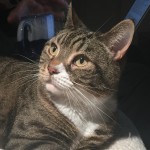News
Archive for June, 2019
Inflammatory Bowel Disease (IBD)
by admin on June 6th, 2019
Category: News, Tags:
What is IBD?
IBD is a disease that causes inflammation in any part of the digestive tract (stomach and/or intestines and/or colon i.e. large bowel). Some breeds of dog, such as Soft Coated Wheaten Terriers have a genetic predisposition to this disease. In other breeds of dogs and cats it can be triggered by a parasite or food intolerance. More commonly no specific underlying cause is found and the disease is thought to be caused by an over-activity of the body’s immune system (which normally fights off infections) to ‘foreign’ proteins (such as food) that are eaten, resulting in inflammation.
What are the signs of IBD?
- Weight loss
- Vomiting
- Diarrhoea
- Increased or decreased appetite
- Blood or mucus in the faeces
How is IBD diagnosed?
IBD is diagnosed by a combination of tests, as several other diseases can cause similar signs. Blood tests are often performed to rule out other underlying diseases such as liver or kidney disease, and faecal examination is performed to look for any parasites. Cats with IBD can have low vitamin B12 levels therefore vitamin B12 is measured in all cats.
As foreign body obstructions, or sometimes tumours, can cause weight loss and vomiting, X-rays or ultrasound scans are usually performed to rule out these problems.
Finally, the ultimate diagnosis of IBD is made by taking biopsies from the stomach, intestine or colon. Usually this is performed under a general anaesthetic using a flexible endoscope camera, of which we have several different sizes to suit different sizes of patient. This is not an invasive procedure and most pets recover very quickly and will go home within 24 hours.
How is IBD treated?
Many dogs and cats will improve following a dietary trial. Often this involves prescribing a new diet that is hypoallergenic (i.e. unlikely to cause a reaction) or contains a protein source that your pet has not eaten before (such as venison or salmon). This is fed for 1 to 2 months and it is very important that no other food, treats or tit-bits are given. Some pets won’t respond to one diet but will respond to an alternative diet.
Pets that don’t respond to diet alone may be prescribed certain antibiotics.
Dogs and cats that are severely affected or that don’t respond to the treatments mentioned above will be prescribed steroids. A high dose is prescribed initially and this is decreased every few weeks for several months. Sometimes in pets that don’t tolerate steroids or don’t respond to steroids alone, other drugs which suppress the immune system are prescribed.
What is the long term outlook? (prognosis)?
IBD has a broad spectrum of severity, ranging from mild vomiting and diarrhoea to severe weight loss and fluid build up in the abdomen. It is not generally a life-threatening disease but can be in severely affected patients. It is not a curable disease, therefore the aim of treatment is to minimise the frequency of vomiting and diarrhoea: it is rare to be able to stop the clinical signs altogether. Keeping a diary of how often the signs are happening can be helpful to us in establishing the success of treatment. Most dogs and cats are able to live a good quality of life following a diagnosis of IBD.
Special Offer – June 2019
by admin on June 6th, 2019
Category: Special Offers, Tags:
Pet of the month – June 2019
by admin on June 6th, 2019
Category: Pet of the Month, Tags:
IBD is not a single disease but a group of chronic gastrointestinal disorders caused by an infiltration of inflammatory cells into the walls of a cat’s gastrointestinal tract. The infiltration of cells thickens the wall of the gastrointestinal tract and disrupts the intestine’s ability to function properly.
IBD occurs most often in middle-aged and older cats.
How is IBD diagnosed?
Symptoms of feline IBD are not specific. They may include vomiting, weight loss, diarrhea, lethargy and variable appetite.
The symptoms of IBD can vary depending on the area of the digestive tract affected.
A definitive diagnosis of feline IBD can only be made based on microscopical evaluation of tissue collected by means of an intestinal (or gastric) biopsy.
How is IBD treated?
The treatment of IBD usually involves a combination of change in diet and the use of various medications. There is no single best treatment for IBD in cats. Your veterinarian may need to try several different combinations to determine the best therapy for your cat.
Hypoallergenic diets are usually tried first. Corticosteroids like prednisolone may be used to reduce inflammation of the gut, and antiobiotics such as metronidazole are commonly used.
What does the future hold for a cat with IBD?
IBD is a chronic disease. Few cats are actually cured. Symptoms of IBD may wax and wane over time. IBD can often be controlled such that affected cats are healthy and comfortable. Vigilant monitoring by the veterinarian and owner is critical.
We are very pleased to report that Bob has responded well to dietary management and is currently not requiring additional medication. Luckily he is not adept at hunting and so we have no fear that he might upset the illness through illicit snacks!




